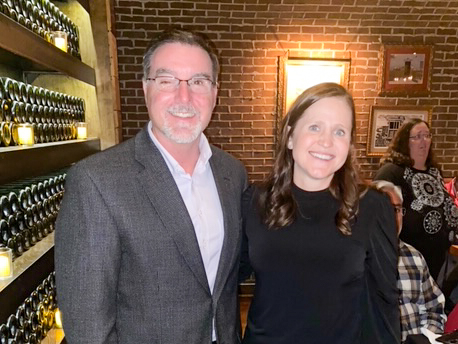Teacher Spotlight: Jenna Glory
ASL teacher saves friend’s life with kidney donation

ASL teacher Jenna Glory poses with Principal Kenneth Wooten at Teacher of the Year dinner. Glory received the secondary teacher award for 2020-21.
April 11, 2022
American Sign Language (ASL) teacher Jennifer Glory saved a life last year by donating her kidney to a fellow teacher and friend she met through church. Glory’s surgery was on April 13, 2021, and it was a major success for both her and her recipient.
This decision majorly altered her life and the friend receiving the kidney transplant. Glory’s decision had many factors included, but she was exposed to the process of organ donors and transplants multiple times in her life before this opportunity approached her. Her first exposure to organ donation was when her fifth grade teacher received a liver donation. After this encounter, her best friend’s dad was diagnosed with kidney disease in high school. After a long battle and several years of dialysis, he passed away, waiting for a kidney that never came.
Glory filled out an interest survey on Nov. 28, 2020, which started the long process. It took two months of testing and interviews at UT Southwestern Hospital for the surgical team to meet and review their case. Glory and her friend were approved on Feb. 2, 2021. After that, another two months updating the tests for Glory’s recipient, getting the COVID vaccine and then prepping for surgery.
Her friend was diagnosed with kidney disease at age 11. On the day of surgery, his kidney function was 8%. Ten months later, his kidney function was 49%. He will have to take medicine for the rest of his life, but he and Glory are both happy with the outcome.
“It required a lot of soul searching, prayer, and considering how donation would affect my family and my long term health,” Glory said. “After a two-month medical process and lots of time spent in prayer, I was thrilled to find out that I was a match.”
This process requires a lot of medical tests to analyze a donor’s current health and a look at the medical history of his or her parents and grandparents to gauge future health.
During the process, Glory had support from a social worker at the hospital, a third-party donor advocate, her nurse manager, and her husband. She and her husband decided not to tell people about the transplant until she had been approved and had 100% decided to go through with the donation.
“A few of my students were concerned because they understood the significance not only of the surgery but of living the rest of my life with only one kidney,” Glory said.
After going through this life-changing experience, Glory has taken away many insights she will carry with her.
“I would love to see living organ donation become more common so that people could receive their transplant before their body gets so damaged spending years on dialysis,” Glory said. “If you are a healthy person, maybe one day, you’ll get the chance to share your health with another person.”







